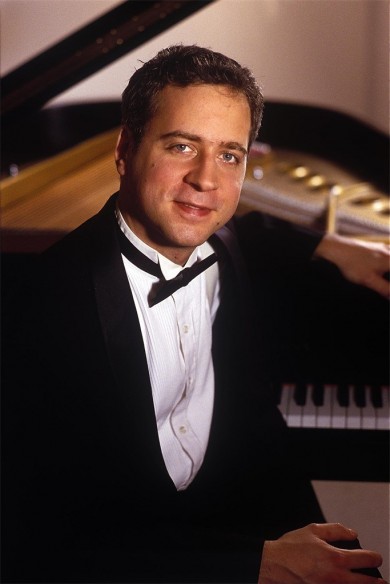Denk’s blazing artistry makes the case for Ives’ “Concord” sonata

Jeremy Denk. Photo: Henry Fair
The New World Symphony’s intensive Ives weekend concluded Sunday night with a program that showcased the pioneering American composer in all his anarchic, icon-smashing glory—the epic Piano Sonata No. 2, Concord, heard not once but twice, in the original piano version and in Henry Brant’s orchestration.
Spanning four movements and nearly fifty minutes, the Concord hails from Ives’ favored strain of American Transcendentalism, with each section inspired by a specific writer. Emerson, the massive 16-minute opening movement is a dense monolith with much craggy grandeur amid the Beethoven quotations, and profusion of surging notes. Hawthorne, surprisingly, is a fantastical scherzo with in-jokes aplenty, and The Alcotts bestows a homespun, Stephen Foster-like, domestic simplicity.
Thoreau ends the work with a quiet, searching slow movement, a solo flute bringing a touch of Walden Pond’s peaceful meditation. Like so many Ives works, the Concord sonata’s final cadence is unresolved and the philosophical quest continues.
Tackling this work is a daunting task but pianist Jeremy Denk served up a staggering tour de force performance Sunday night at the Lincoln Theatre. The American pianist possesses a steel-fingered technique, and Denk blazed through the knottiest sections with knuckle-busting bravura, bringing great clarity to Ives’ most dissonant contrapuntal thickets.
Denk also showed supreme sensitivity in the more introspective moments and had the sense of the discursive work’s architecture, keeping the Emerson movement’s long span unfolding in a continuous arc and bringing great tenderness to The Alcotts. Thoreau made a fitting culmination bringing the thematic development full circle, Denk’s performance ending with the right hushed searching expression. People can differ on the place of Ives’ Concord sonata in the Romantic piano repertory, but Jeremy Denk’s extraordinary advocacy had many convinced we were hearing a true masterpiece.
One can go a long time without hearing a single performance of the Concord sonata, let alone two, so kudos to Michael Tilson Thomas and the New World for giving us Henry Brant’s orchestrated version after intermission. It was interesting to hear—once.
Like Ives with the original, Brant, who died in 2008, spent years on his retooling of the piano sonata as A Concord Symphony. However faithful and scrupulous he may have been in his task, the orchestral version is, to put it charitably, not a success.
Scored for huge orchestra, Ives’ dense counterpoint and fusillade of notes comes across as raucous and wildly overblown—veering from a kind of Mahler stuck in low gear to deafening cacophony, the music acceptable on a keyboard but lumbering and miles over the top when pounded out by full symphonic forces.
Even MTT couldn’t make a convincing case for this unkempt Leviathan and giving it the souped-up treatment only made Brant’s cochlea-damaging orchestration seem even more empty. The musicians responded with polished professionalism, but it’s hard not to agree with the New World pianist on stage who had her fingers in her ears for much of the performance.
[Photo of Jeremy Denk by Henry Fair.]
Posted in Performances
2 Responses to “Denk’s blazing artistry makes the case for Ives’ “Concord” sonata”
Leave a Comment
Mon Feb 23, 2009
at 1:15 pm
2 Comments







Posted Feb 23, 2009 at 3:45 pm by Kathy Wilkowski
Your review seems to be a bit biased in favor of the original Concord Sonata, as opposed to Brant’s orchestration. It would be nice (and perhaps useful to the readers who were unable to attend the concert)to offer some information on how the audience responded to each performance. I have heard Brant’s A Concord Symphony several times live. The work was, in each case, a tremendous success. It received standing ovations every time I heard it live (over 5 minutes of applause in Amsterdam’s Concertgebouw). I can’t imagine that MTT did not conduct it well. Your review leaves me with a lot of unanswered questions. (Is there something wrong with the acoustic in the hall?). Something does not add up here.
Posted Feb 23, 2009 at 8:38 pm by Fred Kaufman
Larry,
We are in absolute agreement about last night.
I loved the first part, he was amazingly gentle and did a great job on this complex work.
I thought that the second part was an absolute bust. It was over orchestrated and lacked all sensitivity of line that was present in the piano work. I hated it so much I ran away after the first movement.
Stay well, it was wonderful to see you again.
fred